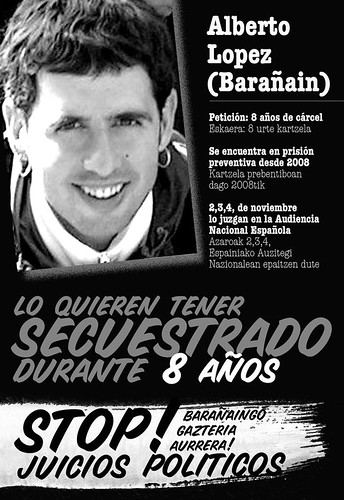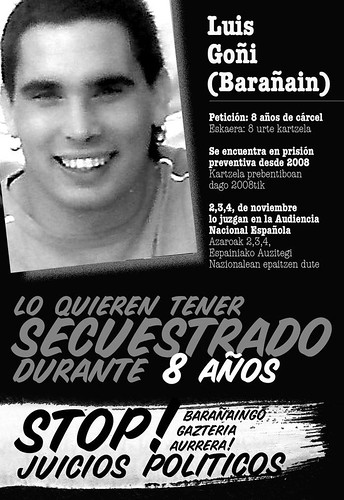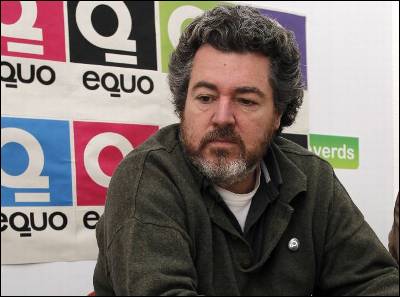Yesterday there were general elections in the artificial and rather stinky Kingdom of Spain and, as you may already know, the right wing People's Party (PP) won by landslide. What you may not know is that it only got a handful of votes more than they had in last elections, when they lost. It has been in fact the massive runaway of votes from the ruling Socialist Worker Spanish Party (PSOE) which allowed the victory of right.
 |
| Elections or not, what mattered in Tolosa were their top quality alubs |
In the Southern Basque Country, unlike in Spain proper, no big surprises in relation to the last elections, just a bit more of "Spanish flavor", probably because of the scope of the polls (which motivates more the unionist camp than the independentist one).
Basque electoral results
In the Southern Basque Country the vote was quite divided among the four larger political blocs, each obtaining above 320,000 but under 340,000 votes (21-23% of issued votes). Still the separatist forces lead the count overall, even if less strongly than
in the previous provincial elections, getting also more seats in the Spanish Parliament.
 |
| Amaiur celebrated an expected good result |
While the votes gathered by the Basque nationalists have been similar as in the elections of May, the Spanish nationalist parties have been able to attract a number of otherwise idle voters, that in the local and provincial elections remained at home.
The overall distribution of the vote in the Southern Basque Country is as follows [in square brackets and green color: May 2011 results, provided for comparison]:
- People's Party-Union of the Navarrese People* (PP-UPN): 336,455 (22.27%) [253,920]
- Amaiur: 333,628 (22.08%) [345,264 <<Bildu+Aralar]
- Socialist Worker Spanish Party (PSOE): 326,999 (21.65%) [227,739]
- Basque Nationalist Party (EAJ-PNV): 323,517 (21.42%) [327,011]
- United Left (IU): 61,852 (4.10%) [49,608]
- Yes to the Future! (Geroa Bai!)**: 42,411(2.81%) [36,262 <<NaBai]
- Other and blank votes: 85,800 (5.8%)
*PP and UPN run separately in the provincial and municipal elections of May but signed an electoral pact again for the state elections, overall they represent the same Spanish nationalist right-wing neo-Carlist option, just that UPN sells it as "Navarrese regionalism" (a strange anti-Basque kind of "regionalism"). Here they are counted as a single electoral option, same for other even more trivial organizational differences between Western Basque Country and Navarre (PSOE, IU).
**Geroa Bai! , of exclusively Navarrese scope, is the heir of Nafarroa Bai! (Yes to Navarre!, NaBai). This one was initially formed (while the main bloc of the Basque Nationalist Left was proclaimed illegal by the Spanish tribunals) as a coalition of all Basque Nationalist forces: Aralar (the largest), Eusko Alkartasuna (2nd largest), independents and EAJ-PNV (residual then in Navarre).
It was generally expected that the votes of NaBai would go mostly to Amaiur, as Aralar joined the joint left-wing project, but it has not been that way at all. In fact GeBai was the big surprise of yesterday's election in what affects Basques by taking the fifth seat of Navarre, which
I had already mentioned that would be disputed by Amaiur and PP-UPN. Well, that was counting with the votes of NaBai going to Amaiur at least in part and that was the big surprise yesterday. Eventually, at the very last of the count, it became known that it was Geroa Bai! and not UPN-PP which took that disputed seat by a narrow margin of some 200 votes.

It has been claimed that this success of GeBai is largely product of the charisma of list head, Uxue Barkos (pictured), former TV news anchor made a unifying icon of the Basque Nationalists in Navarre and then almost a martyr because of her struggle with cancer. She was the independent (and independentist) voice of Navarre in Madrid for the last many years and it is likely that Navarrese voters have taken that into account.
However from the bigger picture a question remains. This coalition victory in Navarre was actually the only thing that EAJ-PNV leader Xabier Urkullu had to celebrate yesterday night. Being the only organized party that remains member of the Navarrese coalition, I and many others wonder if and how much GeBai! will serve as grapple for the Aranist party to return to Navarre, region that they forfeited in the 1980s for the proverbial lentil soup (the position of Mayor of Bilbao), causing a major breakup that formed the more left-leaning and more strongly independentist Eusko Alkartasuna (Basque Solidarity), now integrated in Amaiur.
Certainly that's what Urkullu probably hopes.
 |
| Basque seats in the Spanish Congress (lower house) |
Spain: PSOE lost 4.3 million votes, PP gained 500 thousand
Yes, these are the strange figures that you won't probably find in most media, focused on supporting the ailing single-twin-party system. In detail at the level of all the strange Kingdom of Spain (based on
RTVE)
[in red and square brackets results from 2008]:
- People's Party (PP, right) - 10,799,034 [10,278,010]
- Socialist Worker Spanish Party (PSOE, center-left?) - 6,955,423 [11,289,335]
- United Left-The Greens (IU-LV, left) - 1,676,857 [969,946]
- Union for Progress and Democracy (UPD, populist maverick) - 1,137,397 [306,079]
- Convergence and Union (CiU, Catalan nationalist, right) - 1,011,505 [779,425]
- Amaiur (Basque Nationalist, left) - 333,628 [not comparable because of political persecution]
- EAJ-PNV (Basque Nationalist, right) - 323,517 [306,128]
- Esquerra (Catalan Nationalist, left) - 256,393 [298,139]
- EQUO (Green left) - 215,776 [did not exist]
- Galician Nationalist Bloc (Galician Nationalist, left) - 183,279 [212.543]
- Canarian Coalition (Canarian regionalist, right) - 143.550 [174.629]
- Compromise Coalition (Compromís, Valencian ample spectrum left, incl. greens and nationalists) - 125,150 [did not exist as such coalition]
- Anti-Bullfighting Party Against Animal Abuse (PACMA, animal liberation) - 101,000
- Asturias Citizen Forum (right, individual maverick) - 99,173
- Blank Seats (would not have occupied their seats) - 97.706
 |
| IU grows but could have done much better |
There are many more lesser lists but among them only one got a seat, Geroa Bai! in Navarre (see above). Of the above all but EQUO, PACMA and Blank Seats got at least one seat.
Abstention (28.31%) was two points higher than in 2008 and null votes doubled (1.29%).
It must be noted that the Spanish electoral system is markedly designed to favor the parties that are most important in rural ill-populated provinces. It is a quasi-feudal electoral system in fact. Each province (no matter it has zero personality as is often the case) gets two seats just because (making 100 out of 350, not counting African enclaves Ceuta and Melilla) and the remaining is apportioned also among provinces. So most such provinces have 3-5 seats, which are invariably split between the two largest parties, thanks to the D'Hont system. Only a few urban provinces break this rule but they are not enough to change things, typically, the
near-empty provinces of Castile and Aragon have the greatest importance on who wins general elections, at least if they have some support in some more populated areas like Madrid or Andalusia.
Tercera Información offers an spreadsheet with the hypothetical "fair" results if the elections would have been held in a single all-Spain circumscription with proportional system. If so the PP would be short of an absolute majority by some 18 seats, having obtained only 158 deputies, the PSOE would be even worse than it is already with just 102 seats, while all-Spain alternative options like United Left or UPyD would be much better (25 and 17 seats respectively) and many small options that have been left out (notably Equo and their Valencian allies of Compromís) would have got representation.
However such a single circumscription system would be even more unfair for the oppressed nationalities such as Basques and Catalans, which would lose some representation that way. In any case it is a useful comparison.
In any case there is one phenomenon happening here: the PP almost did not get any extra votes (so it is a Pyrrhic victory), while the PSOE lost 4.3 million supports, one third of all 2008 voters. Why? Quite obviously because they were applying IMF+EU policies and bailing out the banks while cutting social services, allowing debt slavery and doing absolutely nothing to solve an extremely severe unemployment problem. This is exactly what the new conservative government will do with even more determination (they had no program but it's obvious).
Where did those four million plus votes go to? An array of left-wing parties split much of it. United Left (the natural option) took some but not so many (700,000). Equo, led by former Greenpeace activist Juantxo López de Uralde (pictured), undoubtedly got another small share (300,000 possibly, counting Compromís) and some 600,000 went to abstention maybe.
But a worrisome 800,000 such votes seem to have gone to the party of the infamous populist maverick Rosa Díez, UPyD, which has the support of some far right parties.
Rosa Díez is a former Basque PSOE militant, who became regional councilor under a coalition government and who later left the PSOE to form her own viscerally anti-Basque populist platform. The party is firmly under the grip of Díez (what caused many to exit it) and counts with the support of infamous cross-dressing right-wing pseudo-intellectuals such as Mario Vargas Llosa and Fernando Savater. It got 5 seats, 4 in Madrid and 1 in Valencia.
In any case this election, rather than a right wing victory, has been a total defeat of the violin rule of the quite pathetic PSOE, supported by the ballots of the sociological left but clearly under control of the bourgeois globalist right.


































